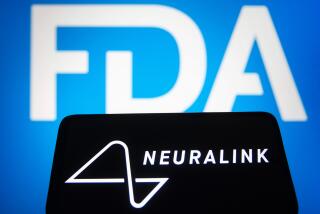Cells Implanted in Woman May Reverse Brain Damage
PITTSBURGH — Doctors at the University of Pittsburgh Medical Center have implanted laboratory-grown human nerve cells, originally obtained from a young man’s cancer, into the brain of a 62-year-old stroke victim in an effort to reverse the woman’s brain damage.
The pioneering surgery, which took place June 23 but was announced Wednesday, represents the first attempt to treat a stroke with a nerve cell transplant as well as the first time that laboratory-grown adult cells have been implanted into the human brain.
The cells, chemically coaxed to turn into brain cells over nearly 20 years of research, restored mental function and the use of limbs when they were implanted into the stroke-damaged brains of rats.
If such implants prove safe and effective for brain damage caused by stroke in humans, they probably will also be tested as treatments for damage caused by other disorders, including Parkinson’s disease, spinal cord injuries and head injuries, researchers said.
“In general, progress in medicine is made by small steps,” said John R. Marler, a neurologist at the National Institute of Neurological Disorders and Stroke. “To me, this is one of the few large steps, just because it’s such a new direction.”
The patient, Alma Cerasini of Pittsburgh, left the hospital the day after her operation and appears to have suffered no ill effects, although it probably will take months before her physicians know whether the implanted cells have any effect on the paralysis of her right side, doctors said.
Twelve stroke victims between the ages of 40 and 75 are being recruited to undergo the experimental procedure at the medical center as part of a government-approved pilot study to determine whether the nerve cell implants are safe.
If the initial results are favorable, the implants will be tested in more patients to determine whether they can reverse brain damage, said Douglas Kondziolka, a University of Pittsburgh professor of neurosurgery who performed the operation.
Stroke is the leading cause of adult disability, and no treatment exists to reverse stroke-related brain damage. It occurs when a clot or hemorrhage blocks a blood vessel that nourishes an area of the brain, leading to the death of nerve cells. About 700,000 Americans suffer strokes each year, and almost half of the survivors are permanently disabled, Marler said.
The nerve cells used in the operation are descended from cells of a testicular tumor that was removed from a 22-year-old man in the 1970s. During more than a decade of research at the University of Pennsylvania, Philadelphia’s Wistar Institute and the University of South Florida, scientists discovered that the cells could be chemically induced to mature into nerve cells that can perform different functions depending on where in the brain they are placed, much like those in the brain of a developing fetus.






